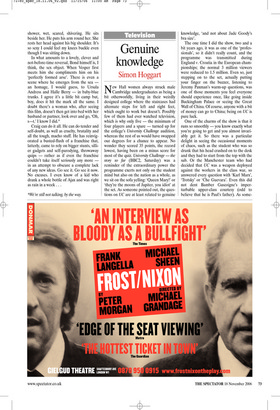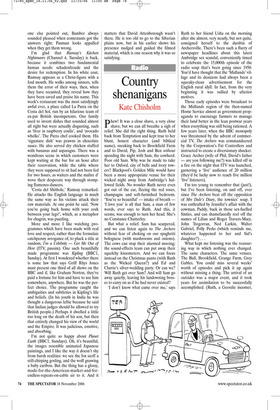Genuine knowledge
Simon Hoggart
New Hall women always struck male Cambridge undergraduates as being a bit otherworldly, living in their weirdly designed college where the staircases had alternate steps for left and right feet, which ought to work but doesn’t. Possibly few of them had ever watched television, which is why only five — the minimum of four players and a spare — turned up for the college’s University Challenge audition, whereas the rest of us would have swapped our degrees for a chance to appear. No wonder they scored 35 points, the record lowest, having been on a minus score for most of the quiz. University Challenge — the story so far (BBC2, Saturday) was a reminder of the extraordinary power the programme exerts not only on the student mind but also on the nation as a whole, as we sit on the sofa yelling: ‘Queen Mary!’ or ‘they’re the moons of Jupiter, you idiot’ at the set. As someone pointed out, the questions on UC are at least related to genuine knowledge, ‘and not about Jade Goody’s bra size’.
The one time I did the show, two and a bit years ago, it was as one of the ‘professionals’, so it didn’t really count, and the programme was transmitted during England v. Croatia in the European championships; the normal 3 million viewers were reduced to 1.5 million. Even so, just stepping on to the set, actually putting your finger on the buzzer, listening to Jeremy Paxman’s warm-up questions, was one of those moments you feel everyone should experience once, like going inside Buckingham Palace or seeing the Great Wall of China. Of course, anyone with a bit of money can go to China; being on UC is pure luck.
One of the charms of the show is that it runs so smoothly — you know exactly what you’re going to get and you almost invariably get it. So there was a particular delight in seeing the occasional moments of chaos, such as the student who was so drunk that his head crashed on to the desk and they had to start from the top with the sub. Or the Manchester team who had decided that UC was a weapon deployed against the workers in the class war, so answered every question with ‘Karl Marx’, ‘Trotsky’ or ‘Che Guevara’. Even this did not dent Bamber Gascoigne’s imperturbable upper-class courtesy (odd to believe that he is Paul’s father). As some one else pointed out, Bamber always sounded pleased when contestants got the answers right; Paxman looks appalled when they get them wrong.
I’m glad that Ramsay’s Kitchen Nightmares (Channel 4, Tuesday) is back, because it combines two fundamental human needs: schadenfreude and the desire for redemption. In his white coat, Ramsay appears as a Christ-figure with a foul mouth. He walks among sinners, tells them the error of their ways, then, when they have recanted, they reveal how they have been saved and praise his name. This week’s restaurant was the most satisfyingly awful ever, a place called La Parra on the Costa del Sol, run by an hilarious team of ex-pat British incompetents. Our family used to invent dishes that sounded almost all right but were actually disgusting, such as ‘liver in raspberry coulis’, and ‘avocado whelks’. The Parra chef cooked them. His ‘signature dish’ was prawns in chocolate sauce. He also served dry chicken stuffed with bananas and asparagus. There was a wondrous scene in which customers were kept waiting at the bar for an hour after their reservation, while the table where they were supposed to sit had not been fed for two hours, as waiters and the maître d’ wove their desperate way through stomping flamenco dancers.
‘Costa del Shithole,’ Ramsay remarked. He attacks the English language in much the same way as his victims attack their raw materials. At one point he said, ‘Now you’re going back home with your cock between your legs!’, which, as a metaphor for chagrin, was puzzling.
More and more I like watching programmes which have been made with real love and respect, rather than the formulaic catchpenny arrogance of, to pluck a title at random, I’m a Celebrity — Get Me Out of Here (ITV, passim). One such beautifully made programme was Kipling (BBC1, Sunday). At first I wondered whether there is some law that says Griff Rhys Jones must present one third of all shows on the BBC and if, like Graham Norton, they’ve paid a fortune for him and have to use him somewhere, anywhere. But he was the perfect choice. The programme caught the ambiguities and subtleties in Kipling’s life and beliefs. (In his youth in India he was thought a dangerous leftie because he said that Indian judges should be allowed to try British people.) Perhaps it dwelled a little too long on the death of his son, but then that entirely changed his view of the world and the Empire. It was judicious, emotive, and absorbing.
I’m not quite so happy about Planet Earth (BBC1, Sundays). Oh, it’s beautiful, the images resemble animated Japanese paintings, and I like the way it doesn’t shy from harsh realities: we see the fox scoff a still-chirping gosling, and the wolf gnawing a baby caribou. But the thing has a glossy, made-for-the-American-market-and-forendless-repeats-on-cable air to it. And it matters that David Attenborough wasn’t there. He is too old to go to the Siberian plains now, but in his earlier shows his presence nudged and guided the filmed material, which is one reason why it was so satisfying.



































































































 Previous page
Previous page